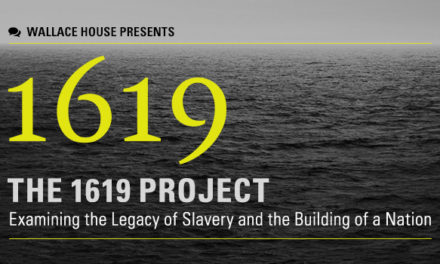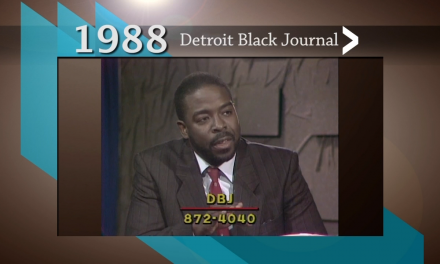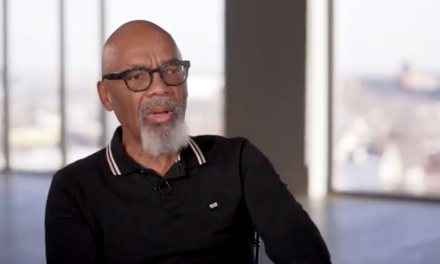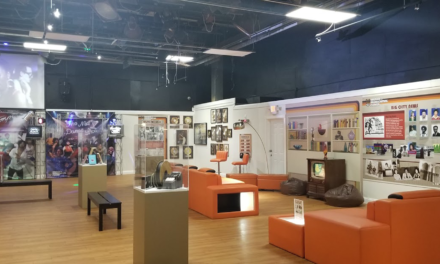What role do Detroit’s Black churches play in the success of Detroit Public Schools and their students? American Black Journal’s “Black Church in Detroit” series examines the important role of the church as champions for the city’s schools and students, and how the church fills the gaps, helps solve issues, and supports Detroit schools to make sure students can reach their full potential.
Host Stephen Henderson sits down with Rev. Larry Simmons of Baber Memorial AME Church, Rev. Carnel Richardson of New Prospect Missionary Baptist Church, and Sharlonda Buckman, assistant superintendent of family and community engagement at Detroit Public Schools Community District (DPSCD) for a thought-provoking conversation.
They discuss two programs, DPSCD’s Faith-Based Initiative and Every School Day Counts program, and talk about some of the issues impacting education, such as chronic absenteeism, a lack of transportation, and health and safety concerns.
Plus, they look at how the DPSCD’s Faith-Based Initiative matches churches with schools in order to provide mentoring, tutoring, clothing drives, and other support services that will allow students to concentrate on getting a good education.
Full Transcript:
Stephen Henderson, Host, American Black Journal: Sharlonda Buckman, Reverend Simmons, and Reverend Richardson, welcome to American Black Journal.
Rev. Larry Simmons, Baber Memorial AME Church, Executive Director, Brightmoor Alliance: Good to be here.
Sharlonda Buckman, Assistant Superintendent, Detroit Public Schools Community District: Thanks for having us, Henderson.
Rev. Carnel Richardson, New Prospect Missionary Baptist Church: Thank you.
Stephen Henderson: Yes, it’s good to see all three of you. Sharlonda, I want to start with you and have you just walk us through the idea you had for greater involvement of the religious community, and black churches in particular, with Detroit schools. And sort of how that has come together, what that looks like in the system right now.
Sharlonda Buckman, Assistant Superintendent, Detroit Public Schools Community District: Yeah. Thank you, Henderson. And, you know, I’m born and raised in Detroit. And so, anybody who has that as part of the narrative knows Detroit is still a church town. It is a place where we still highly regard our religious leaders. If you don’t have anywhere else to go, you can go to the church and they will take care of you. That’s what I know just from a little girl growing up here. As this administration started, I think it’s been over five years ago now with Dr. Vitti, we were very intentional in our conversations and recognize that our churches have always been champions for schools.
They’ve always been involved in some informal way, working on issues. The coalition leading up to us being able to secure a local school district with an elected board, including leaders like Reverend Simmons, they were always present. And so, what we wanted to do was formalize those relationships. We wanted to make sure we had a council. That was the first thing that was representative of every religious order, where that was a platform that they had direct access to the superintendent. That was the first order of business. And then secondarily, where we realized we don’t have two sets of parents, we have one in the city. And so, it was an opportunity for the pastors and bishops and all those folks to talk directly to Dr. Vitti about the things that they were seeing, some of the ideas that they had, and also be thought partners around how to solve some of the issues we were facing.
At the same time, we had a number of schools who didn’t have faith-based partners. And so, the second part of that work was intentional to make sure every single relationship was formal. We have a simple M.O.U, where the school sits down with the pastor of the church and they have a conversation first with the principal talking about all the great things that’s happening with the school, all the challenges, and what they need help with. And then, what happens is our faith-based partner then says, Hey, here’s where we think we can help, whether it be mentoring or providing basic needs or afterschool tutoring, you name it, they set the goals, and then we have an agreement in place.
So, the goal was to have every single school have a partner. Up to the pandemic, we had all of our schools except for maybe three or four who did not have partners. And so, we’re getting back to that. We’re about halfway there. And those relationships have been critical up to and through the pandemic in terms of supporting our families and children. So, it still remains a very valuable part of how we continue to move forward and reform the school district.
Stephen Henderson: Yeah. Reverend Simmons, I want to have you talk about the relationship that you have developed with the school system. Not just with this initiative, but also with ‘Every School Day Counts’. But also talk about that greater sort of, I guess, arms around schools, and kids, and education, that is such a big part of the religious community here in the city that goes back decades for sure.
Rev. Larry Simmons: You know, I remember even when I was in my 20s and Reverend Archie, I believe it’s Archie or Archer, who was pastor of St. Paul AME Zion Church, which was on Dexter, led a coalition of pastors who resolved a teacher strike. This is back in the 70s, that’s how far back I have witnessed the church being involved in trying to promote education in Detroit. As you know, it was a mandate of the Christian church to teach. Jesus, as he departed the disciples tells us in Matthew 28, to go and teach. It’s interesting, he says in that passage, to go teach, not preach, baptize, but teach.
Teaching is an integral part of what it is to be a church. It’s also part of other faith traditions. But you know, I’m an elder in the Christian church, in the AME Church, so I speak from that perspective. In every moment of crisis that has happened in this community, Sharlonda is exactly correct, the church and its various leaders, Baptists, Methodists, Non-denominational, Pentecostal, have stepped up and led. We fought to get an elected school board back. So the church is–this is what I tell people, when Detroit was in its most difficult moments, you drive through this thing and what you see is that around the churches, of which there are over 4.000 youths, find this zone of peace. Churches take care of not just their own property, but the property that’s near them.
So, these people left each right and left abandoned property behind. The church has been made and they began to take care of those properties. The church, as an integral part of the social fabric of Detroit, is certainly older than I am. I think it is significant for this discussion is that as we go forward, I encourage and I’ve been making this argument behind closed doors, I’m going to make it now in public, there are 4,000 churches in Detroit, most of them are air-conditioned 24/7. That means that for every day of the year, there’s a building within walking distance of every person in Detroit.
We need to utilize that network of resources to transform them into places where children can come and get additional learning, where they can be supported. But too often, and this is my complaint, too often we have stepped up so willingly for nothing, that when it comes time to distribute resources, people don’t think of making some of those resources available to the church. But this administration has. This administration has and has invited the church in as a partner and has compensated the churches for stepping up, oftentimes as a place where children could go and learn, particularly doing COVID.
Stephen Henderson: Yeah. Reverend Richardson, I want to have you join the conversation here and talk about what’s happening at New Prospect Baptist Church. But also, again, talk about the leverage from the religious community around this idea of supporting schools and supporting kids, that goes back so far in our history in Detroit.
Rev. Carnel Richardson: For the past few decades, New Prospect has been one of the churches on the front line of social justice in Detroit. And certainly, support of our school system is a part of that. And we have adopted Pasteur Elementary School, which is adjacent to our church campus, as a school that we will serve continually. We will meet needs in terms of afterschool tutoring. We will continue to meet other human needs when parents come to us for basic life necessities because there’s a shortage and there’s insecurity. We are available to help and to assist in those areas.
And when we were approached by Ms. Buckman about partnering on the faith-based Council, we were certainly elated to do that and to continue the work that we’ve already been doing. The God that we serve is a God of justice and a God of compassion. And certainly, we want to live that out in our everyday experiences. And helping our children to be all that they can be, it fits into that. That whole social justice mandate that falls within the Christian life. And so, we’ve witnessed children come to our after-school program and grow, and learn, and develop, and then go and soar as a result of their involvement. I remember a child a few years ago who had all F’s in school, and I refused to give up on him.
My church leaders refused to give up on him. He actually won our spelling bee that we did in our after-school program. Today, he’s a senior in high school and he’s on the honor roll and he hopefully will go on to college. And when I’m in the restaurant and in other spaces and places, I often run into his grandmother, who just comes to tears when she thinks about the opportunity that he got at the church. This is truly a partnership that must continue. I’m asking other church leaders to get involved, to do what they can do as a part of this initiative. Get in touch with Ms. Buckman and her office, because this is valuable work and this is for our babies, for our children.
Sharlonda Buckman: And Henderson, I want to jump in really, really quickly because, you know, one of the things that I want to elevate, based on what Reverend Richardson just mentioned, is just this whole idea of a continuity of love and support and safety for our children beyond the pale. That’s what has happened over in Cody. That’s what Reverend Simmons is referring to in terms of that extension. When our schools closed, there’s a place for them to go. And not only do they get the support around tutoring and things like that that keep them out of trouble, they also get the mentorship. We also deepen relationships.
Some of this is about connecting people to people. We’ve become so disparate in our communities at different points that people feel very isolated. And so, this has been also about pulling families out of isolation into conversation and relationships with other organizations and entities that can support them beyond the school, because the needs sometimes are insurmountable. To be able to protect teaching and learning in the classroom, working in partnership with our church, this has been the difference many times.
Stephen Henderson: I mean, that point about how profound the needs are for our kids in this city, and the idea that we put so much on a school system that has them for six or six and a half hours a day. There’s no way you could expect that would meet those needs. I mean, you are always going to need other institutions, other individuals to step up and provide for the gaps. Reverend Simmons, I want to have you talk about ‘Every School Day Counts’, because that issue, in particular, absenteeism is a longstanding issue in the city. But especially during and after the pandemic, it’s really given us fits.
Rev. Larry Simmons: Well, this is the perfect segue way, because what we believe with ‘Every School Day Counts Detroit” is that it does take a village to raise a child. And too often we have placed all the onus for absenteeism or chronic absence, which means you’re absent 10% or more of time, we place the onus, the burden of that almost completely on the school. It’s not a school problem. It’s measured in school, but the problem starts out in the community. And so, our view in ‘Every School Day Counts Detroit’ is that we want to bring resources and make the awareness up and down the social ladder.
All of us have to weigh in, have to join in, have to do what churches are doing, and have to do what the Detroit Pistons did a couple of weeks ago when they came and gave coats to every student in five schools, and sent the ballplayers to speak to the kids about coming to school every day on time. But so many of our parents, I think the number, and if I’m wrong somebody, please correct me, but I think it’s 40% of the households in Detroit don’t have reliable transportation. So, that means that getting kids to school becomes a huge hurdle for many families. The problem, it’s measured in school, but it starts outside. And so, we need the whole village to wrap its arms around this, recognize it, and begin to support families and remove the barriers that cause young people not to be able to come to school. Another one is health. Many of our children are suffering from– we have a higher rate than nationally of, help me Sharlonda…
Sharlonda Buckman: Health Disparities.
Rev. Larry Simmons: Breathing, asthma is what I’m trying to say, of asthma. And believe it or not, is a huge issue with children coming to school. So, part of what we’re saying is that the health system has to change the way it thinks and does its business and begin to place these resources closer to the school, so that children don’t have to miss class. Begin to schedule a visit in ways that facilitate the parent both being able to get to work and the children being able to get to school. But this is a process and it’s going to take all of us. This program, believe it or not, is an important part of that. Because many people who get up and go and practice medicine, or go to work at the factory, they send their kids to school. And really in their mind, they’ve done it. They’re done. It’s over, it’s finished. I’ve done my part, but it takes a lot more than that.
Sharlonda Buckman: And I think, Henderson, It’s important to note that the district was working with Rev and others, and we’re making some really positive gains on chronic absenteeism before the pandemic. The pandemic exasperated the issue in a way that we’re really fighting now to get our kids back. And some of the residue of the pandemic in terms of mental health. The losses have been insurmountable, the isolation that a lot of our young people feel. So we’ve gone in very heavily on mental health supports and things like that. But also, safety is an issue for a lot of our young ladies and young men, but particularly young ladies around who have to walk to school or walk to the bus stop.
And so, I’m glad Rev, you lifted that this is a community issue because we have our own police department. But the number of kids in schools across this community, 110 school buildings, upwards of 50,000 children, we need the community to be watchers of our children so that they feel safe. We cannot leave our children to fend for themselves in terms of their safety getting to school. So, it’s a very complex issue. But I think in this space of chronic absenteeism, we have quite a few folks who are working on the issue and it really is a fight right now. We need as many churches to get involved as possible, working with our schools, supporting our schools at the local level, and we’re halfway there. But hopefully, this show will help us get some additional partners.
Rev. Larry Simmons: As you know, I’m a methodist, but I got to give a shout-out to the Council Baptist pastors.
Sharlonda Buckman: That’s right.
Rev. Larry Simmons: They’re leading an effort over at Mackenzie to bring mentors to young people who have been chronically absent. And hopefully, this pilot that they’re doing, along with the pilot that ‘Every School Day Counts’ is doing, and that others are doing, but that these are ways that brings the community to engage and bring in a solution to the problem and it is not just a school problem. I could say that a thousand times. This is a community challenge. It’s a village problem and the village has got to solve this.
Stephen Henderson: All right. Well, congratulations to you, Reverend Simmons, and Reverend Richardson on the work that you and your churches are doing. Hopefully– boy, wouldn’t it be something if we had all 4,000 churches in the city participating in some way in this. Every school would have more than one church.
Rev. Larry Simmons: If they each adopted ten kids, that would be 40,000 kids with mentors.
Sharlonda Buckman: That’s right. We welcome that opportunity. Thank you for presenting the challenge, Henderson. We welcome that opportunity. We’re ready. We just need some additional partners to step up. And I think protecting and supporting the least of the is critical, and that’s our kids.
Stay Connected:
Subscribe to Detroit Public Television’s YouTube Channel & Don’t miss American Black Journal on Tuesday at 7:30 p.m and Sunday at 9:30 a.m. on Detroit Public TV, WTVS-Channel 56.
Catch the daily conversations on our website, Facebook, Twitter and Instagram @amblackjournal.
View Past Episodes >
Watch American Black Journal on Tuesday at 7:30 p.m. and Sunday at 9:30 a.m. on Detroit Public TV, WTVS-Channel 56.




